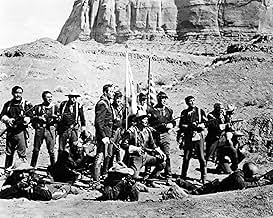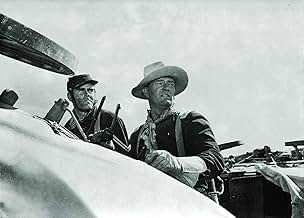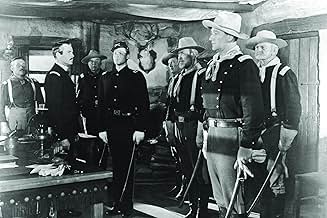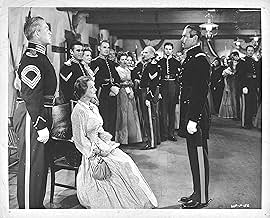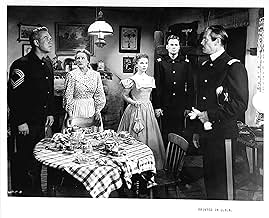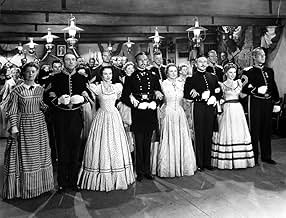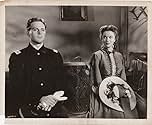Em Fort Apache, um honorável e veterano capitão de guerra encontra conflito quando seu regime é colocado sob o comando de um jovem tenente-coronel faminto de glória, sem respeito pela tribo ... Ler tudoEm Fort Apache, um honorável e veterano capitão de guerra encontra conflito quando seu regime é colocado sob o comando de um jovem tenente-coronel faminto de glória, sem respeito pela tribo indígena local.Em Fort Apache, um honorável e veterano capitão de guerra encontra conflito quando seu regime é colocado sob o comando de um jovem tenente-coronel faminto de glória, sem respeito pela tribo indígena local.
- Direção
- Roteiristas
- Artistas
- Prêmios
- 2 vitórias e 1 indicação no total
- Sgt. Beaufort
- (as Pedro Armendariz)
- Cochise
- (as Miguel Inclan)
- Cavalryman
- (as Philip Keiffer)
- Direção
- Roteiristas
- Elenco e equipe completos
- Produção, bilheteria e muito mais no IMDbPro
Avaliações em destaque
When you watch this film, it tends to give you the visuals needed, to prove to you, that this movie is way ahead of its time. Ford's use of his actors, his framing of the shots, his utilization of the terrain, as well as, the cloud patterns in the sky, along with excellent experience with black and white film, all make his films pop more than most of his other fellow filmmakers of the time. What's even crazier is he can get this effect out, even with standard 4:3 cameras. We need to remember, this was a pre-widescreen film and because of Ford's excellent compositions, you forget that it is in standard screen size.
This is an interesting casting job for Henry Fonda, who plays Lieutenant Colonel Owen Thursday, who through politics, is sent to a barren location in dangerous Apache territory, to take command of Fort Apache, a few years after the Civil War ended. It is a disrespectful demotion for him, so naturally he is a little bit sour about the whole thing, which translates to arrogance, when he has to deal with his new soldiers he has at his command. In his attempt to retrieve his glory days, he negatively rubs up against his subordinates, most notably, Captain Kirby York (John Wayne). York's experience and knowledge of the Apache Indians, their leader Cochise (Miguel Inclan), the surrounding area of the Apache territory and the rugged Arizona landscape, collides with Thursday's need to succeed.
At the same time, Thursday's daughter, Philadelphia (Shirley Temple), is stirring up things as well, falling in love with a young soldier, 2nd Lieutenant Michael Shannon O'Rourke (John Agar in his first film), which totally brings the stuffy arrogance out of Thursday. His disapproval is felt quite heavily in the plot and coming from the screen. Fonda gives a great, convincing performance, as the disgruntled Thursday, who needs to solve the problem with the Apaches, as well as, coming to terms with his daughter's future. He expels the arrogance and impudence from the screen, but also shows us his honorable, professional, polite side, that comes from the roots of his successes during the war.
There also are a number of other classic Hollywood actors, who do their part, to make this film the critical success it has enjoyed for the last 75 years. Names like, Ward Bond, Dick Foran and Grant Withers, just to name a few. If you are looking for a textbook John Ford movie, especially one in 4:3, this is the one to see. Hopefully, you are pleasantly tricked up too, when you realize, that this film isn't widescreen too, just like I was. It looks that good.
8.6 (B+ MyGrade) = 8 IMDB.
It's first and foremost the story of a clash between two men who see the United States Army in very different terms. Fonda is a former general who's seen glory in the Civil War, but has been shunted aside. He wants to get back on top in the worst way. He's exiled to Fort Apache in the Arizona territory while the big headlines concerning the Indian wars are going to the campaign against the plains Indians which was true enough.
Wayne has also seen some glory in the Civil War. But he's a professional soldier and just wants to live long enough to retire. In fact Ward Bond who is the sergeant major at the post has also dropped down in rank, he was a major in the Civil War and a Medal of Honor winner. This was a common occurrence at the end of the Civil War. During the war, promotions came swiftly because of battlefield service. Something called a brevet rank was instituted a kind of temporary promotion. You could be a brevet brigadier general and have an actual rank of something like major. After the Civil War as the U.S. Army shrunk to its pre-war size, soldier reverted to previous ranks. This was something John Ford was keenly aware of when he made Fort Apache.
Ford's stock company was never better. Even minor bit parts are woven nicely into the whole story. And his photography of Monument Valley, it's beauty and vastness was never better even when he used color. Look at the scenes with John Agar and Shirley Temple riding and with Wayne and Pedro Armendariz on their way to parley with Cochise. Really great cinematography.
Ford had a couple of inside comments in the film. In a scene where Henry Fonda is getting an incomplete message from the post telegrapher, the telegrapher who might have strolled in from a Cagney-O'Brien film informs his commander that the message was interrupted "in the middle of the last woid." With both Irish and southern recruits in Fort Apache, a Brooklynese telegrapher would not have been out of place.
George O'Brien and Anna Lee, play Sam and Emily Collingwood who both knew Henry Fonda's Owen Thursday way back in the day. It's hinted that O'Brien had a drinking problem and that's why he's at Fort Apache, but he's looking for a transfer out. It comes as the regiment is moving out against Cochise.
Charles Collingwood was the second in command to Admiral Nelson at Trafalgar. Nelson became a British hero martyr, historians know about Charles Collingwood. When newspapermen at the end of Fort Apache remark about men like "Collingworth"not being remembered, it was John Ford making a statement about the worth of all the men who contribute their lives to defend their nations not just the leader heroes.
That remark by the way is the stage for one of John Wayne's finest acted scenes in his career. A soliloquy photographed through a cabin window about the life of the professional soldier, the camaraderie, the toughness, the bravery required of these men and how they deliver for their nation.
In a later film John Ford uses the line that in the west "when the legend becomes fact, print the legend." Henry Fonda's quest for martial glory was a blunder, but his story for the sake and tradition of his regiment is whitewashed and he becomes an inspiration.
Of course some of the lowbrow comedy that one expects from John Ford is here aplenty with the four drinking sergeants and their efforts to make soldiers out of the recruits. Led by Victor McLaglen, the quartet rounds out with Dick Foran, Jack Pennick, and Pedro Armendariz. See how they dispose of the contraband they are charged with destroying and its consequences.
Fort Apache also takes the side of the Indian here. Cochise played by an impassive Miguel Inclan is a figure of strength and dignity. Later on Jeff Chandler in another film brought speech to the dignity and that role launched his career. Cochise is the only true major figure in the film. He bedeviled the U.S. Cavalry for over a decade in Arizona Territory with guerrilla tactics Mao Tse Tung would have envied.
Fort Apache is a grand ensemble film and you will not be bored for one second in watching it.
The headstrong commander refuses to listen to the advice of his loyal captain, Kirby York, who knows frontier life and enjoys a rapport with the indian chiefs. The two officers are both strong characters, and their differing ideas inevitably lead to a clash.
Cochise and his braves are willing to accommodate the white man so long as their concerns are handled with diplomacy. Unfortunately, the high-handed approach of Lieutenant-Colonel Thursday cause relations to deteriorate, and conflict ensues.
In the course of the 1940's and 50's, director John Ford returned repeatedly to this subject-matter, John Wayne in Monument Valley with the US cavalry, fighting redskins and singing Irish folksongs. The stirring anthem in this movie is "The Girl I Left Behind Me", sung as the regiment rides out in full panoply to meet Cochise - although "She Wore A Yellow Ribbon" gets an airing, too.
The cavalry regiment itself is a protagonist in the story, regarded as a living entity by its members. When Captain York is promoted to Colonel and commands the regiment, he makes a powerful speech stressing the continuity and tradition which have made the regiment great. The sense of hierarchy is strong. This is a world of order in which army regulations govern even the way an officer presents his calling-card. Soldiers can quote the regulations by heart. This well-regulated military force will, we feel, impose civilisation on this wild frontier.
Examples of the regiment's rigid code keep recurring. The NCOs' dance has its own elaborate protocol, which not even Colonel Thursday dares to flout. Feelings over the O'Rourke marriage reach boiling-point, but everyone adheres to the rules of military courtesy. Washington's Birthday is celebrated as a regimental occasion. The Irish sergeants are all related by blood and marriage, and as their exuberant fraternal greetings subside, military discipline asserts itself effortlessly.
"I'm not a martinet," protests Colonel Thursday, the most extreme martinet imaginable. He is inflexible in his enforcement of the military code, and too stubborn and wrongheaded to listen to the advice of his officers, who are experienced frontier campaigners. He completely misses the presence of Cochise's war party because he has no combat experience and doesn't know to watch the skyline for dust clouds. In addition, Thursday is a terrible snob. He calls young Michael O'Rourke a 'savage' for a perceived laxity of discipline, and sets his face against the marriage of Michael and Philadelphia because of "the barrier between your class and mine". He is dismayed that the son of a sergeant should have passed through West Point, and needlessly offends Cochise by talking down to him.
And yet even Owen Thursday has a human side. We gather that there is some personal secret between him and Captain Collingwood, and we almost smile when the armchair collapses under him. Most tellingly, Thursday returns to the beleaguered redoubt after he has been rescued. He redeems himself by rejoining his soldiers in the thick of the fighting.
When young Philadelphia Thursday (Shirley Temple) studies Michael O'Rourke in her purse mirror, we know that these two will be the love interest. Also, as this incident illustrates, the womenfolk of Fort Apache tend to run the show in this masculine enclave. The Thursday residence is somewhat joyless, especially when compared with Aunt Emily's cosy quarters. The women brush aside the colonel's seniority and call in Mrs. O'Rourke to refurnish the place. In one of the film's good jokes, no fewer than eight Mrs. O'Rourkes answer the call. There is a touching scene when the regiment moves out and the women are left together. Mrs. Collingwood is torn, because her husband has his safe posting back east and needn't go into battle, but she knows how important it is for him to prove his courage. The womenfolk urge her to call him back, but she reluctantly allows him to ride out.
John Ford laced many of his films with Irish humour, and "Fort Apache" is no exception. The ubiquitous Victor McLaglen plays Sergeant Festus Mulcahy, and he and the O'Rourkes run the fort - that is, whenever they are not in the jailhouse on charges of drinking and brawling. Outrageously, Mulcahy promotes a raw recruit to corporal, simply because he's Irish. Quincannon virtually lives in the jailhouse, but he has a fine tenor voice, so he is released from custody in order to serenade the young lovers with his rendition of "Genevieve". When the dishonest trader Meacham has his whisky stock confiscated and marked for destruction, the sad faces of the sergeants make a comical picture, and the subsequent 'destruction' is even funnier.
Ford is a master of composition. York rides out to parley with Cochise and is engrossed in dialogue, leaving Thursday stranded and excluded. We hear the thunder of hooves offscreen before we see the charge, and its impact is magnified accordingly. In the sequence where York and Beaufort ride to negotiate with Cochise, the screen is filled with stunning images of rock and sky. The charging cavalry are cleverly 'lost' in their own dust, which closes behind them like a curtain, ending the scene.
Wayne is curiously subdued in this film. This is partly because he plays a conscientious subordinate, and partly because the confrontation with Fonda is eclipsed by other plot developments.
This is an old style western from legendary director John Ford. Henry Fonda is somewhat miscast as the hard-headed, arrogant commander. John Wayne is the heroic one with the moral high ground. It may be better to switch the two leads. While John Wayne can be either, I don't see Fonda that way. As for the Apache, at least Cochise is played by a Mexican and the natives are shown as proud people. The first half is a bit slow. It has the old western humor and the first battle happens only at the halfway point. The most notable aspect is that the final battle has the sides switched from their standard roles. There is an obvious allusion to a historical event. It has something to say about the glorification of war. This is a western epic.
Você sabia?
- CuriosidadesThe cast member who had the hardest time with John Ford was John Agar, making his film debut. Whether it was because Agar was newly married to Ford's beloved Shirley Temple or because he wanted to test him, the director rode him mercilessly, calling him "Mr. Temple" in front of everyone, criticizing the way he delivered lines, chastising him for his lack of expert horsemanship. One day Agar stormed off, vowing to quit the picture, but John Wayne took him aside and helped him with some of the more difficult aspects of his job.
- Erros de gravaçãoAt 01:00:20 a small truck is seen on a road in the background, behind and to the right of the row of Apaches who are about to attack the repair wagon.
- Citações
Lt. Col. Thursday: This Lt. O'Rourke - are you by chance related?
RSM Michael O'Rourke: Not by chance, sir, by blood. He's my son.
Lt. Col. Thursday: I see. How did he happen to get into West Point?
RSM Michael O'Rourke: It happened by presidential appointment, sir
Lt. Col. Thursday: Are you a former officer, O'Rourke?
RSM Michael O'Rourke: During the war, I was a major in the 69th New York regiment... The Irish Brigade, sir.
Lt. Col. Thursday: Still, it's been my impression that presidential appointments were restricted to sons of holders of the Medal of Honor.
RSM Michael O'Rourke: That is my impression, too, sir. Will that be all, sir?
- Versões alternativasGerman version is cut to 92 minutes. It is not not known why the film was cut for the German market in 1948.
- ConexõesEdited into John Ford, l'homme qui inventa l'Amérique (2019)
Principais escolhas
Detalhes
Bilheteria
- Orçamento
- US$ 2.500.000 (estimativa)
- Faturamento bruto mundial
- US$ 11.928
- Tempo de duração2 horas 8 minutos
- Cor
- Proporção
- 1.37 : 1
Contribua para esta página



